Waste Management Professional
Entry Level Qualification
Graduate
Career Fields
Business & Management
For Specially Abled





About Career
Waste is anything that has no value or is no longer used by the owner. It could also be a by-product of something that cannot be put to use again. We know that waste is generated in our day to day life by household, industrial or commercial activities and can be classified into biodegradable waste, recyclable waste, e-waste, hazardous waste, toxic waste, biomedical waste etc.
Therefore, as a Waste Management Professional, you would be involved in managing and implementing ways to organize how the waste generated will be collected; what methods or techniques will be used to separate different waste types; how the waste will be disposed of and where; as well what measures would be implemented to create a sustainable environment.
Key Roles and Responsibilities
As a Waste Management Professional, you would be involved in the following key roles and responsibilities:
1. You would plan and design projects that lead to environmental protection, such as water reclamation facilities, air pollution control systems, and operations that convert waste to energy
2. You would coordinate the documentation required to label, move, track, and report waste and waste initiatives.
3. You would evaluate waste management options and apply a waste hierarchy model in order to reduce, reuse, recycle, recover, and dispose of waste material.
4. You would conduct research and analytical studies on a variety of waste management programs and issues.
5. You would investigate the life expectancy of consumable products and recommend options for more economical and environmentally friendly materials or processes.
6. You would work with company personnel in developing an appropriate and user-friendly waste management system.
7. You would assist in budget preparation and administration, including determining financial methods, procedures, and costs pertaining to environmental compliance and waste management services.
8. You would stay updated with respect to waste management regulations and ensure regulations are being adhered to.
9. You would participate in auditing processes, including approvals, water monitoring reports, engineering designs, and contingency planning.
Career Entry Pathway
Class 10 all subjects as per scheme of studies – Class 11-12 with any subject as per scheme of studies – Bachelor’s degree in any subject - Intern/volunteer with waste management organisations or in Government projects – Become Waste Management Professional.
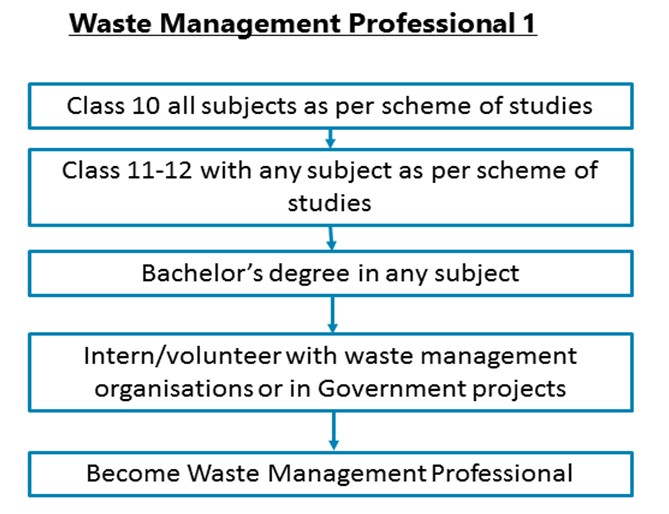
After completing Class 10 all subjects as per scheme of studies then Class 11-12 with any subject as per scheme of studies, you can go for Bachelor’s degree in any subject. After completing graduation you can start working directly as an intern or volunteer with waste management organisations or in Government projects and then become Waste Management Professional.
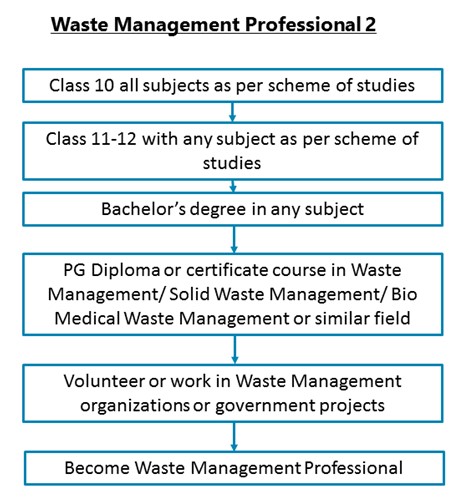
After completing Class 10 all subjects as per scheme of studies then Class 11-12 with any subject as per scheme of studies, you can go for Bachelor’s degree in any subject. After completing graduation you can opt for a PG Diploma or certificate course in Waste Management/ Solid Waste Management/ Bio Medical Waste Management or similar field. You can then volunteer or work in Waste Management companies or government projects and become a Waste Management Professional.
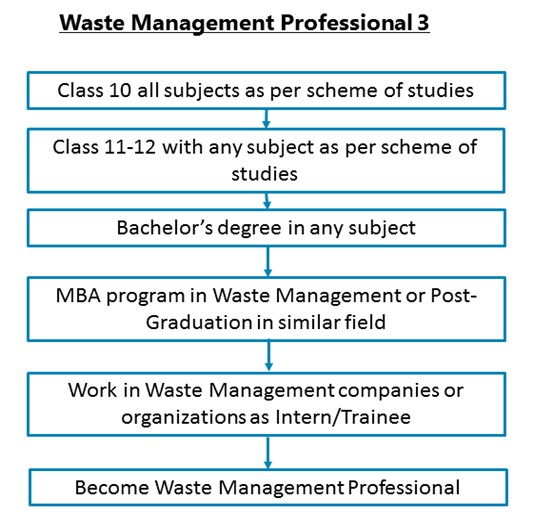
After completing Class 10 all subjects as per scheme of studies then Class 11-12 with any subject as per scheme of studies, you can go for Bachelor degree in any subject. After graduation you can pursue a degree in MBA program in Waste Management or Post-Graduation in similar field and start working in waste management companies or organization as Intern/Trainee for some years and become a Waste Management Professional.
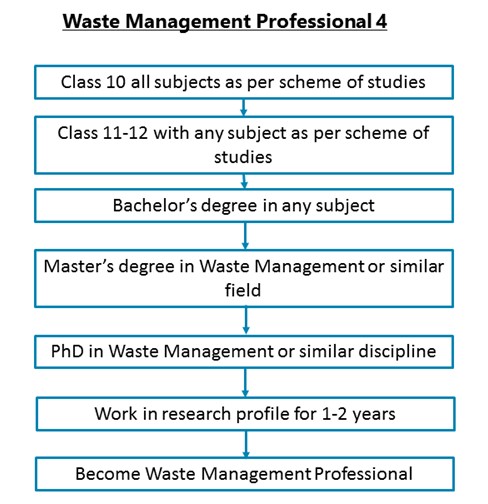
After completing Class 10 all subjects as per scheme of studies then Class 11-12 with any subject as per scheme of studies, you can go for Bachelor degree in any subject. After graduation, if you wish to study further and enter research studies before working as a Waste Management Professional, you need to go for Master’s degree in Waste Management or similar field followed by a PhD in similar discipline. After acquiring PhD you can work as Waste Management Professional. Although it is not necessary to go for a PhD or higher field of study to become a Waste Management Professional as you can start working after a Diploma or certificate course in Waste Management and gain experience in the related field.
Required Qualification & Competencies
After completing higher secondary studies you can go for graduation in any field followed by a Post-Graduate diploma in Waste Management or related field. You can directly start working in Waste Management companies or organizations after your diploma or certification course. In case you wish to go for a degree in management you can go for MBA in Waste Management or related discipline.
MINIMUM EDUCATION REQUIRED | MAXIMUM EDUCATION REQUIRED |
Under Graduate Undergraduate Degree / Honours Diploma / Graduate Diploma (equivalent to a Degree) Programs for which the minimum eligibility is a pass in Higher Secondary / Class XII School Leaving examination. | Doctoral All Ph.D. or equivalent degree programs for which the minimum eligibility is a Postgraduate or a Pre-Doctoral degree. |
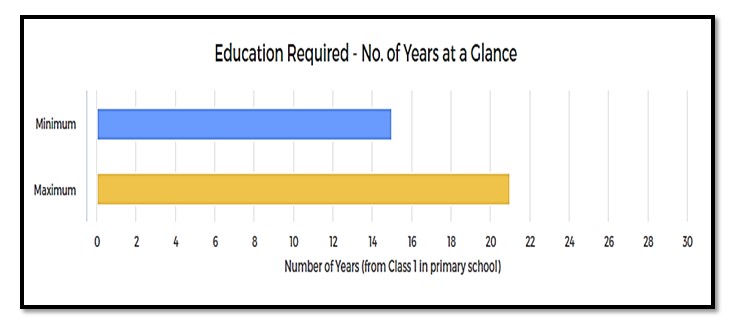
Competencies Required
Interest
1. Investigative: You should have interests for Investigative Occupations. Investigative occupations involve working with ideas and quite a lot of thinking, often abstract or conceptual thinking. These involve learning about facts and figures; involve the use of data analysis, assessment of situations, decision making and problem-solving.
2. Realistic: You should have interests for Realistic Occupations. Realistic occupations involve more practical and hands-on activities than paperwork or office work. Realistic occupations often involve physical activities for getting things done using various tools and equipment.
3. Conventional: You should have interests for Conventional Occupations. Conventional occupations involve repetitive and routine tasks as well as fixed processes or procedures for getting things done. These occupations involve working more with data, systems, and procedures and less with ideas or creativity.
Knowledge
1. Administration: Knowledge of various administrative and operational functions in managing a business or an organization such as general administration, facility management, front office management, back-office management, etc.
2. Business Management: Knowledge of managing a business that involves planning of what to do, organizing resources and people, leading and supervising work activities of people, and monitoring performances of people as well as performance of business. This includes knowledge of marketing, finance, human resources management, operations management, etc.
Skills
1. Active Listening: Giving full attention to what other people are saying, understanding the points being made by others, asking questions, etc.
2. Problem Solving: Skills in analysis and understanding of problems, evaluating various options to solve the problems and using the best option to solve the problems.
3. Reading Comprehension: Skills in understanding written sentences and paragraphs in work-related documents.
4. Critical Thinking: Skills in analysis of complex situations, using logic and reasoning to understand the situations and take appropriate actions or make interpretations and inferences.
5. Coordination: Skills in working together with other people to get things done.
6. Supervising: Skills in Supervising and monitoring performance of others, businesses, and different projects.
Abilities
1. Deductive Reasoning: The ability to apply general rules and common logic to specific problems to produce answers that are logical and make sense. For example, understanding the reasons behind an event or a situation using general rules and common logic
2. Inductive Reasoning: The ability to combine pieces of information from various sources, concepts, and theories to form general rules or conclusions. For example, analyzing various events or situations to come out with a set of rules or conclusions
3. Inter-Personal: The ability to build and maintain good relationships with others at workplaces and elsewhere.
4. Oral Comprehension: The ability to listen to and understand information and ideas presented through spoken words and sentences.
5. Problem Sensitivity: The ability to tell when something is wrong or is likely to go wrong. It does not involve solving the problem, only recognizing there is a problem.
6. Verbal Reasoning: The ability to think and reason with words; the ability to reason out ideas expressed in words.
Personality
1. You are always or mostly organized in your day-to-day life and activities.
2. You are always or mostly care about your actions and behaviour.
3. You are always or mostly disciplined in your action and behavior.
4. You are always or mostly a soft-hearted person.
5. You are imaginative sometimes.
6. You prefer to experience new things and have new experiences sometimes.
7. You act independently sometimes but do not do so in some other times.
Career - Job Opportunities & Profiles
As a Waste Management Professional, you may find work in the following:
1. Engineering, Design, & Waste Management Consulting organizations providing Ecosmart solutions such as 3R Management, ComePost, Ramky Enviro Engineers Ltd, EcoCredible Enviro Solutions Pvt. Ltd., Azyro Infratech, NJS Engineers, etc.
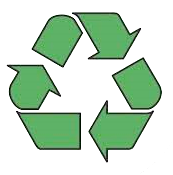
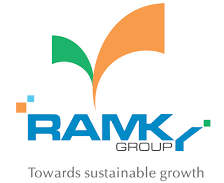



2. Waste management firms such as Kankyo Cleantech, Quantum Green, Integrated Waste Management & Urban Services Company, etc.


3. Recycling companies such as Recyclekaro, Scraptap, Paperworks, etc.
4. Municipal government departments of various states are involved in Public health, sanitation, conservancy, and solid waste management etc.
Specialisation Tracks In This Career
1. Waste Manager (Liquid)
Liquid Waste Management Professionals are involved in supervising and managing liquid waste that is generated by both household and industries. They deal with providing solutions in matters relating to the treatment of dirty and toxic water, organic liquids, harmful industrial fluids and chemicals and rain water.
2. Waste Manager (Solid)
Solid Waste Management Professionals are involved in supervising and managing solid wastes which includes plastic waste, paper waste, metals tins and cans; ceramics and glass waste etc. The professionals specialising in solid waste also look after the waste being properly separated and treated.
3. Waste Manager (Organic)
Organic Waste Management Professionals are involved in activities relating to the treatment and disposal of waste generated by common household such as food/kitchen waste, manure or garden waste etc.
4. Waste Manager (Recyclable)
Recyclable Waste Management Professionals are involved in recyclable waste which includes all the items that can be converted or used again by recovering their material. They manage and implement ways to treat or recycle items such as paper, furniture or organic waste etc.
5. Waste Manager (Hazardous)
Hazardous Waste Management Professionals are involved in managing how the waste generated by industries and other commercial sources such as chemicals or paints can be treated and disposed. Hazardous waste is one of the most difficult to dispose as it impacts not only the environment but also the people involved in disposing it as they are exposed to harmful chemicals and toxic gases.
Career Growth
1. As a Waste Management Professional, you may find various growth progressions. After an MBA/PG Diploma in Waste Management, you join as a Management Associate.
2. You will progress as Management Associate - Assistant Manager - Deputy Manager– Manager– Business Head - Senior Manager - AGM/DGM – VP/GM – Chief Operating Officer – Chief Executive Officer.
3. If you wish to enter government sector you can work for various NGOs starting as an Assistant or a Trainee and progress towards Program Assistant then Program Manager followed by Project Manager or even a Project Head.
Salary Offered
1. As a Waste Management Professional initially you would be working as an intern or trainee, therefore at an entry-level you may earn around, Rs. 15,000 – 25,000 per month.
2. At junior level, with an experience of 2-8 years, you may earn around Rs. 35,000 – 60,000 per month or even more
3. At mid-Level, with an experience of 9-15 years, you may earn around Rs. 70,000 – 1,00,000 per month or even more.
4. At the senior level, with an experience of 16+ years, you may earn around Rs. 1,15, 000 – 1,80,000 per month or even more.
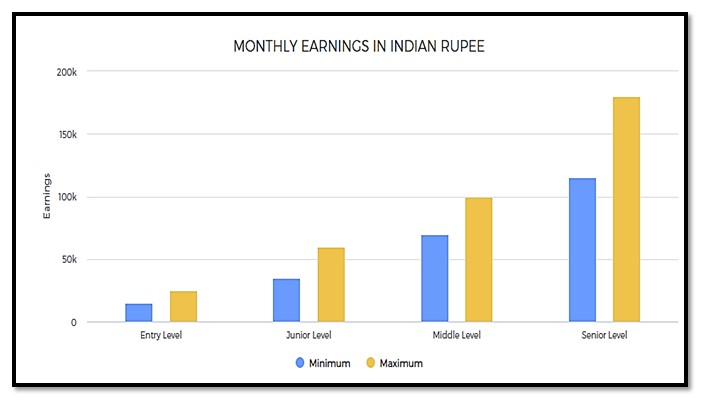
Monthly Earnings In Indian Rupee
Entry Level | Junior Level | Mid Level | Senior Level | ||||
Min Earning | Max Earning | Min Earning | Max Earning | Min Earning | Max Earning | Min Earning | Max Earning |
15000 | 25000 | 35000 | 60000 | 70000 | 100000 | 115000 | 180000 |
1. Entry level: 0 - 2 years of work experience
2. Junior Level: From 1 to 12 years of work experience
3. Mid-Level: From 5 to 20+ years of work experience
4. Senior Level: From 10 to 25+ years of work experience (there could be exceptions in some high-end technical, financial, engineering, creative, management, sports, and other careers; also in the near future, people will reach these levels much faster in many careers and in some careers, these levels will have no meaning as those careers will be completely tech skill driven such as even now, there is almost no level in a Cyber Security Expert’s job)
Work Activities
1. Addressing grievances and resolving conflicts: Handling complaints and grievance to resolve; resolving conflicts among co-workers or others at the workplace or outside in relation to your work.
2. Analyzing and interpreting data and information: Analysis of data and information to find facts, trends, reasons behind situations, etc.; interpretation of data to aid in decision making.
3. Communicating with co-workers and others: Communicating with people in writing, verbally or otherwise inside your workplace and various other people who have professional relationships with your place of work including vendors, government officials, etc. or with people at large
4. Decision making and problem-solving: Analysis of data and information; evaluation of alternative decisions and results of decisions; taking the right decisions and solving problems.
5. Developing and maintaining inter-personal relationships: Developing professional relationships with co-workers and others outside organizations and maintaining good relationships.
6. Estimating quantity, cost, time and resources: Estimating sizes, volumes, distance, and quantity; estimating and determining time, costs, and resources; estimating materials required to perform a task.
7. Getting Information and learning: Observing, hearing, reading, using computers, or otherwise obtaining information and learning from it.
8. Handling administrative activities: Handling various administrative tasks and managing day-to-day operations.
9. Inspecting situations, events, and people: Inspecting situations, events, and people to understand the reasons and causes for the situation or events to happen; inspecting people to understand reasons behind their behavior and actions.
10. Leading: Inspiring and motivating co-workers to work to achieve specific goals; enabling and facilitating others to perform tasks effectively; addressing issues and solving problems in order to help people perform well.
11. Managing and supervising: Managing and supervising work of others; setting goals; giving instructions; monitoring work performance, etc.
12. Organizing, planning and prioritizing tasks: Planning and organizing tasks in order to achieve work goals; prioritizing tasks to achieve goals and making the best use of the time available.
13. Strategic planning: Developing visions and goals, developing strategies and action plans for achieving visions and goals.
14. Updating and using relevant knowledge: Keeping updated with the latest knowledge relevant to your fields of work and use of the relevant knowledge in getting things done.
15. Working in a team: Working in a team of people; developing team; maintaining professional relationships among team members.
Future Prospects
1. According to reports submitted by India Today, India is generating more than 1.50 lakh metric tonne (MT) of solid waste every day. Only 20 % (27,000 MT per day) of the total waste is processed and the remaining 80 % (1, 08,000 MT per day) is being dumped in landfill sites. Moreover, India generated 7.17 million tonne of "hazardous" waste, out of which 3.68 million tonnes or 49.46% was recycled and around 20 lakh tonne of e-waste was produced. According to the Central Pollution Control Board (CPCB), of the estimated 20 lakh tonne of e-waste, only 69,414 MT of garbage was collected, dismantled and recycled.
2. Therefore there is an alarming demand for Waste Management Professionals to manage and supervise the waste management practices in India. The demand in this field will continue to increase in the upcoming years.
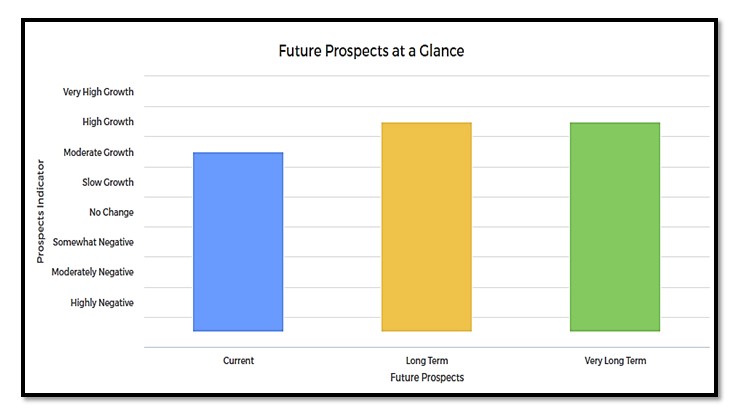
Future Prospects At A Glance
Current (0-1 year) | Long Term (2-5 year) | Very Long Term (6-10 years) |
Moderate Growth | High Growth | High Growth |


